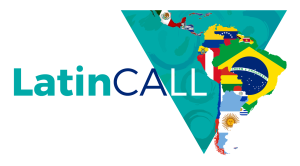LatinCALL24
Completion requirements
This is a list of the titles and abstracts of presenters
Browse the glossary using this index
Special | A | B | C | D | E | F | G | H | I | J | K | L | M | N | O | P | Q | R | S | T | U | V | W | X | Y | Z | ALL
L |
|---|
Leveraging Technology to Foster Democratic Culture Competences: The Role of Virtual Exchanges and UNESCO Story Circles in EFL EducationThe integration of technology in education has opened new avenues for promoting global citizenship and democratic culture among EFL learners through virtual exchanges and intercultural dialogue. This study explores the potential of virtual exchanges, specifically UNESCO’s Story Circles, as a dynamic and technology-driven approach to fostering intercultural competence and democratic values in language education. Byram’s model of Intercultural Communicative Competence (ICC) (1997) underpins the conceptual framework aligned with the Council of Europe’s Reference Framework of Competences for Democratic Culture (RFCDC) (Barrett, 2020). Virtual exchanges, also known as online intercultural exchanges or telecollaboration, have emerged as transformative educational tools that extend beyond geographic boundaries, enabling learners to engage in meaningful intercultural interactions and reflective practices. UNESCO’s Story Circles, designed as a practical intercultural tool, emphasize key competences for democratic culture such as empathy, respect, self-awareness, and active listening (Deardorf, 2020). This study assesses the implementation of Story Circles as reflective activities in a virtual exchange project involving EFL university students from Costa Rica and Japan. By analyzing participant feedback, the research demonstrates how the use of technology through virtual exchanges fosters cultural awareness, empathy, and critical reflection. Ultimately, the findings highlight the role of technological platforms in enhancing UNESCO Story Circles' impact, advancing global citizenship, and supporting inclusive intercultural dialogue within EFL education. | |
